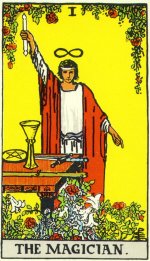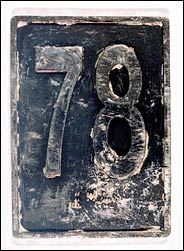|
On the Number 78
| |||
| 1) | The 39th even number = 78 | ||
| 2) |
The 12th
triangular number =
1, 3, 6, 10, 15, 21, 28, 36, 45, 55, 66, 78 Sum of the first 12 numbers: 1+2+3+4+5+6+7+8+9+10+11+12 = 78 | ||
| 3) |
The 16th abundant number = 78 (12, 18, 20, 24, 30, 36, 40, 42, 48, 54, 56, 60, 66, 70, 72, 78) | ||
| 4) |
The 56th composite number = 78 (4, 6, 8, 9, 10, 12, 14, 15, 16, 18, 20, 21, 22, 24, 25, 26, 27, 28, 30, 32, 33, 34, 35, 36, 38, 39, 40, 42, 44, 45, 46, 48, 49, 50, 51, 52, 54, 55, 56, 57, 58, 60, 62, 63, 64, 65, 66, 68, 69, 70, 72, 74, 75, 76, 77, 78) | ||
| 5) |
Sum of the first 8 composite numbers = 4 + 6 + 8 + 9 + 10 + 12 + 14 + 15 = 78 | ||
| 6) | Product of the 1st perfect number and 6th prime numbers = 6 x 13 = 78 | ||
| 7) | Product of the 2nd, 3rd, and 6th prime numbers = 2 x 3 x 13 = 78 | ||
| 8) | Product of the 1st even & 25th composite numbers = 2 x 39 = 78 | ||
| 9) | Product of the 2nd odd & 13th even numbers = 3 x 26 = 78 | ||
| 10) | Difference of the 10th square & 13th composite numbers = 100 - 22 = 78 | ||
| 11) |
Sum of the 12th & 13th
prime numbers = 37 + 41 = 78 | ||
| 12) | The 66th & 67th digits of pi = 78 | ||
| 13) | The 198th & 199th digits of phi = 78 | ||
| 14) |
Number of zeros in
tredecillion (1078) = 78 (British system) (In the American system, tredecillion = (1042) | ||
| 15) | Atomic Number of Platinum (Pt) = 78 (78 protons & 78 electrons) | ||
| 16) |
The 78th day of a non-leap year =
March 19 ( Frédéric Joliot-Curie, French Nobel Prize-winning physicist, was born on this day 5-19-1900 & died on 8-14-1958) | ||
| 17) |
The 78 RPM phonograph records became the
standard in 1926. The common name for such records as 78s or "seventy-eights" as they played at 78 revolutions per minute. | ||
| 18) | In the song The Twelve Days of Christmas, 78 gifts were given on the 12th day. | ||
| 19) |
 The number of cards in a
Tarot deck = 78
The number of cards in a
Tarot deck = 78(22 Major Arcana cards + 56 Minor Arcana cards = 78) Tarot history goes back to the early 1400 in Northern Italy. The 52-deck playing cards were first mentioned in Spain in 1371. Special cards were added that could beat any card of the four ordinary suits— called trionfi (triumphs), from which our word trumps is derived. When the game spread from Italy, the word Tarocco became Tarot in French and Tarok in German. By the late 1400, the 78 card pack with 21 trumps, 14 cards per suit and a Fool had become fairly standard. Until the 18th century, the four suits were: "spade" (swords), "bastoni" (batons), "coppe" (cups), "denari" (coins). In the late 18th century, the coins and batons were transformed into pentacles and wands, and the term "major arcana" was introduced for the 22 trumps. | ||
| 20) |
Seventy-Eight Degrees of Wisdom: A Book of Tarot (1998) by Rachel Pollack brings awareness of myth and modern psychology to the Tarot's ancient symbolism. The author provides a thorough description of each card encompassing art, history, literature, mythology, and psychology. (Book Review by Laylian) | ||
| 21) |
 An elevator floor plaque
An elevator floor plaquefrom the 78th floor of the World Trade Center recovered from the wreckage (New York State Museum) NY Times, 11-25-2003 | ||
| 22) |
Hymn 78 in Book 7 of the
Rig Veda is an invocation to Dawn:
We have beheld her earliest lights approaching: her many glories part, on high, asunder... Rich Daughter of the Sky, we all behold her, yea, all men look on Dawn as she is breaking... Inspired with loving thoughts this day to greet thee, we and our wealthy nobles have awakened. Show yourselves fruitful, Dawns, as ye are rising. Preserve us evermore, ye Gods, with blessings. | ||
| 23) |
78th word of the King James Bible's Old Testament Genesis = called
1: In the beginning God created the heaven and the earth. 2: And the earth was without form, and void; and darkness was upon the face of the deep. And the Spirit of God moved upon the face of the waters. 3: And God said, Let there be light: and there was light. 4: And God saw the light, that it was good: and God divided the light from the darkness. 5: And God called the light Day, and the darkness he called Night. And the evening and the morning were the first day. — Genesis I.1-4 (1611) | ||
| 24) |
Maschil of Asaph addresses to the Israelites in 78th Psalm:
2: I will open my mouth in a parable: I will utter dark sayings of old: 3: Which we have heard and known, and our fathers have told us. 15: He clave the rocks in the wilderness, and gave them drink as out of the great depths 16: He brought streams also out of the rock, and caused waters to run down like rivers — Psalms 78.2-3, 78.15-16 (1611) | ||
| 25) |
Lao Tzu,
Tao Te Ching, Verse 78:
Nothing in the world is weaker than water but against the hard and the strong nothing excels it for nothing can change it the soft overcomes the hard the weak overcomes the strong this is something everyone knows but no one is able to practice thus the sage declares who accepts a country's disgrace we call the lord of soil and grain who accepts a country's misfortune we call the king of all under Heaven upright words sound upside down. (translated by Red Pine, Tao Te Ching, Mercury House, San Francisco, 1996, p. 156) | ||
| 26) |
78th Verse of Buddha's
Dhammapada: On the Wise Do not keep company with evildoing friends nor with people who are base; associate with the good, associate with the best of men. Buddha, Dhammapada Verse 78 (240 B.C.) (translated by Harischandra Kaviratna, Dhammapada: Wisdom of the Buddha, 1970) | ||
| 27) |
78th Book of Enoch describes the Sun & Moon, Waxing & Waning of the Moon:
“And on the first day she is called the new moon, for on that day the light rises upon her. She becomes full moon exactly on the day when the sun sets in the west, and from the east she rises at night, and the moon shines the whole night through till the sun rises over against her and the moon is seen over against the sun.” — Book of Enoch LXXVIII.12-13 (circa 105 B.C.-64 B.C.) | ||
| 28) |
78th Tetragram of the T'ai Hsüan Ching: Chiang / On the Verge December 3 (pm) - December 7:
| ||
| 29) |
78th Trigraph of the Ling Ch'i Ching: Chieh Chin / Abstaining The image of appropriately withdrawing A cluster of yin contrary to their positions Oracle: Quarreling and fighting in their drunkenness, both knives and staffs are drawn. Only when the host, becoming fearful, humbles himself does it cease. Verse: Dwelling in prosperity, one should ponder and contemplate; Effecting plans lies in discerning the moment. When setting out the wine vessels, guard against uncouth guests; By being humble and retiring, one can be free of anxiety. Tung-fang Shuo, Ling Ch'i Ching (circa 222-419) (trans. Ralph D. Sawyer & Mei-Chün Lee Sawyer, 1995) | ||
| 30) |
Verse 78 of Rubáiyát, of
Omar Khayyam (1048-1122): What! out of senseless Nothing to provoke A conscious Something to resent the yoke Of unpermitted Pleasure, under pain Of Everlasting Penalties, if broke! (translated by Edward Fitzgerald, London, 1st edition 1859, 2nd edition 1868) | ||
| 31) |
Invoking the Muse in 78th Sonnet of William Shakespeare: So oft have I invoked thee for my Muse, And found such fair assistance in my verse As every alien pen hath got my use And under thee their poesy disperse. Thine eyes, that taught the dumb on high to sing And heavy ignorance aloft to fly, Have added feathers to the learned's wing And given grace a double majesty. Yet be most proud of that which I compile, Whose influence is thine, and born of thee: In others' works thou dost but mend the style, And arts with thy sweet graces graced be; But thou art all my art, and dost advance As high as learning my rude ignorance. William Shakespeare (1564-1616), Sonnets LXXVIII, Commentary | ||
| 32) |
78th Poem of Emily Dickinson:
| ||
| 33) |
| ||
| 34) |
Opus 78 of Johannes Brahms' Violin Sonata #1 in G Major (Vivace ma non troppo, Adagio, Allegro molto moderto) was composed 1878-1879, in the idyllic surroundings of the resort town of Pörtschach. It was published in November 1879. Brahms connected this work to lyrical G-major sonatas by Mozart (K. 301) & Beethoven (Op. 96), as well as to a quote from Goethe's Queen of Heaven: "Come, rise to higher spheres." Clara Schumann hoped that this last movement would accompany her in her journey to the next world. | ||
| 35) |
At Age 78: Euripides (485 BC-406 BC), Greek dramatist, writes The Cyclops & Orestes (408 B.C.) Oliver Wendell Holmes, Jr. (1841-1935), U.S. Supreme Court Justice, gives his definition of free speech (no right to shout "fire" in a theater) in 1919. Giovanni Giolitti (1842-1928), becomes Italian Prime Minister for the fifth time (1920) Henri Matisse (1869-1954), French painter, designs for the Chapel of the Rosary, Vence, France (1947) Granville Stanley Hall (1899-1924), U.S. psychologist, publishes Senescence (1922) D. T. Suzuki (1870-1966), Japanese Zen scholar publishes Zen Doctrine of No-Mind (1949) Erich Fromm (1900-1980), U.S. psychoanalyst publishes To Have or To Be (1970) [Sources: World Almanac Book of Who (1980); Jeremy Baker, Tolstoy's Bicycle (1982), pp. 478-480] | ||
| Top of Page
| Numbers
| Dates
| A-Z Portals |
| Art & Spirit
| Books
| Enlightenment
| Poetry
| Home |
![]()
| © Peter Y. Chou, WisdomPortal.com P.O. Box 390707, Mountain View, CA 94039 email: peter@wisdomportal.com (6-3-2003) |
 |


